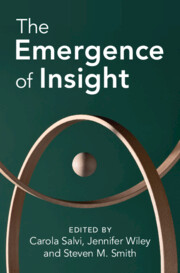Book contents
- The Emergence of Insight
- The Emergence of Insight
- Copyright page
- Contents
- Contributors
- I Introduction
- II Fixation and Insight
- Chapter 2 The Past and Future of Research on So-Called Incubation Effects
- Chapter 3 Forgetting and Inhibition as Mechanisms for Overcoming Mental Fixation in Creative Problem Solving
- Chapter 4 Overcoming Internal and External Fixation in Problem Solving
- Chapter 5 How Impasse Leads to Insight
- III Pathways to Insight
- IV After Insight
- V Cognitive Neuroscience of Insight
- VI Conclusion
- Index
- References
Chapter 4 - Overcoming Internal and External Fixation in Problem Solving
from II - Fixation and Insight
Published online by Cambridge University Press: 02 May 2024
- The Emergence of Insight
- The Emergence of Insight
- Copyright page
- Contents
- Contributors
- I Introduction
- II Fixation and Insight
- Chapter 2 The Past and Future of Research on So-Called Incubation Effects
- Chapter 3 Forgetting and Inhibition as Mechanisms for Overcoming Mental Fixation in Creative Problem Solving
- Chapter 4 Overcoming Internal and External Fixation in Problem Solving
- Chapter 5 How Impasse Leads to Insight
- III Pathways to Insight
- IV After Insight
- V Cognitive Neuroscience of Insight
- VI Conclusion
- Index
- References
Summary
Problems can be difficult to solve when individuals become fixated by misleading information. A popular method for studying fixation in problem solving externally induces it by priming misleading solutions. However, fixation can also arise internally from incorrect solutions that are strongly activated by prior knowledge. The work summarized in this chapter considers both sources of fixation. It also considers the effects of warnings, and the countervailing influences that individual differences in working-memory capacity (WMC) may have. Higher WMC or attentional control may sometimes help individuals to retrieve solutions, maintain task-relevant goals, and use hints or warnings, but at other times may make individuals more prone to fixation. This chapter describes studies that explored both sources of fixation, how warning participants about possible sources of fixation might affect problem solving success, and whether benefits from warnings of what to avoid relate to individual differences in WMC. Both internal fixation from prior knowledge and external fixation from exposure to misleading primes led to poorer performance on a word-fragment completion task. Providing participants with a warning about the misleading solutions sometimes led to poorer performance (rather than better). Within the conditions where individuals received warnings, the likelihood of reaching correct solutions depended on WMC. Several results highlight potential differences between internal fixation from prior knowledge and external fixation from recent exposure. An important direction for future research is to continue to explore the differences that might be seen in insightful solution processes and experiences depending on the source of the initial fixation, and the extent to which fixation from prior knowledge and from recent exposure may need to be overcome differently.
Keywords
- Type
- Chapter
- Information
- The Emergence of Insight , pp. 60 - 83Publisher: Cambridge University PressPrint publication year: 2024

